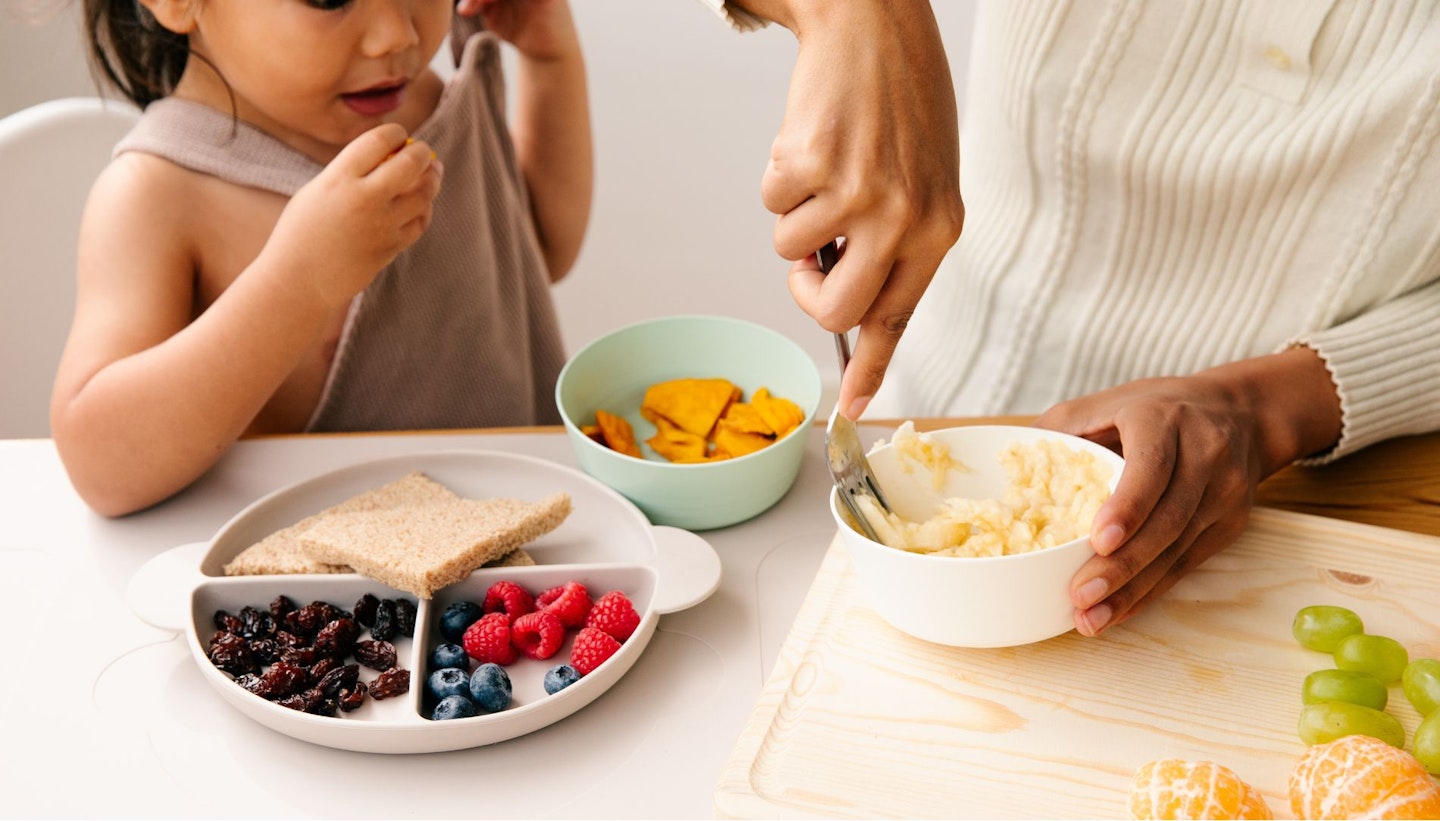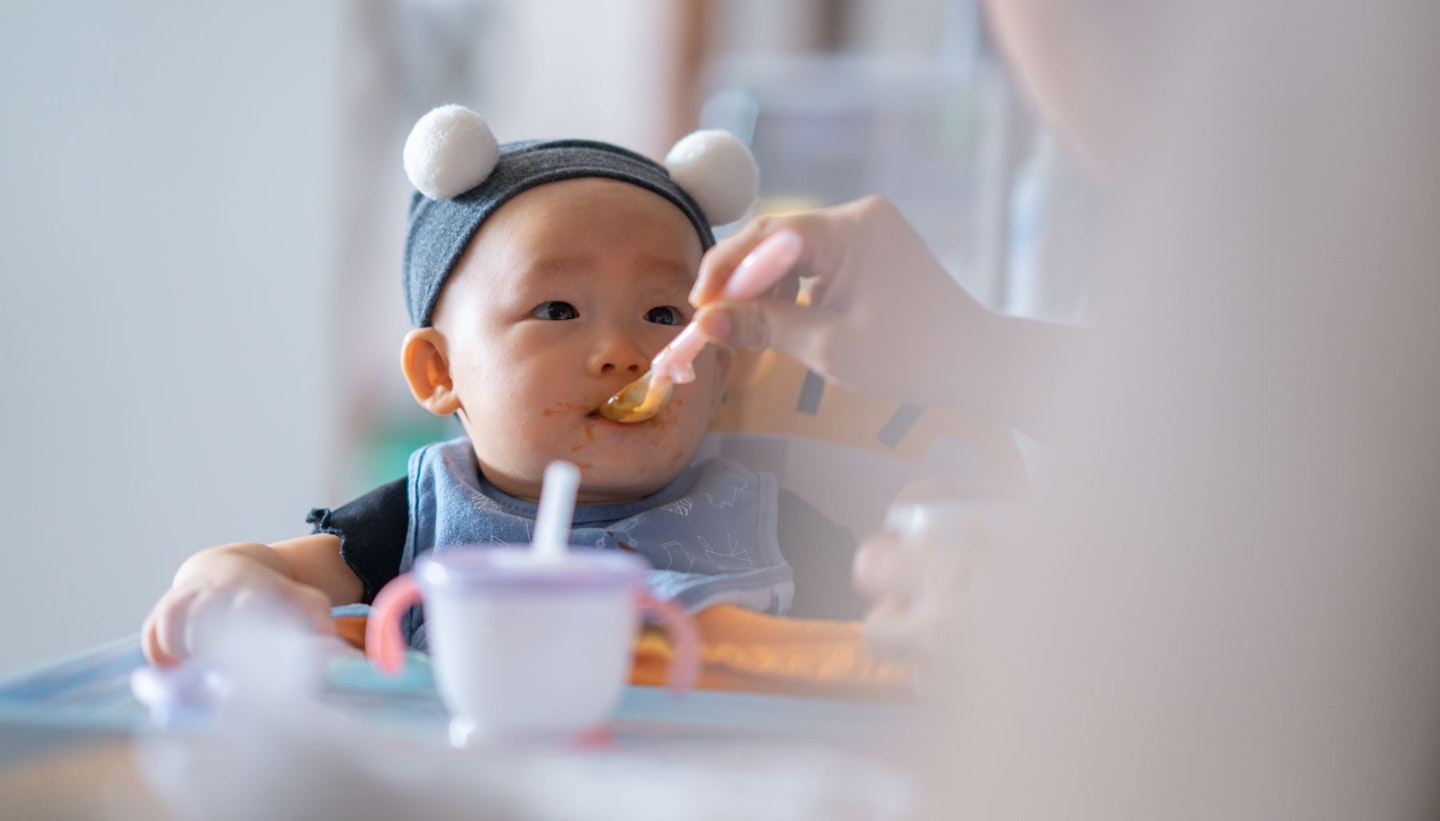As the temperatures drop and the chilly weather rolls in, many of us find ourselves dealing with sniffles and coughs—not just from ourselves but from our little ones, too! It can feel like an endless cycle of colds and runny noses, especially since babies can catch up to 12 colds a year. Yes, you read that right! According to the NHS, the average is about eight colds, and while that's completely normal, it doesn’t mean we can’t take some steps to help keep our little ones healthy and happy.
So, what can we do? From whipping up nutritious meals to making sure our babies are bundled up nice and warm, there are plenty of easy ways to boost your baby's immune system this winter. We spoke to nutrition experts and pharmacists who shared their top tips to keep your baby feeling healthy and happy during the cold months.

Which food increases immunity in babies?
When it comes to foods that increase immunity in babies, Dr Carrie Ruxton, a dietitian says, “Several nutrients are important for optimal immunity, namely iron, zinc, selenium, and vitamins A, B complex, C, and D.” Good food sources of these immunity nutrients include “citrus fruits, red peppers, broccoli, carrots, berries, beans, eggs, fish, and red meat.”
Angie Willis adds, “Breast milk provides everything a baby needs from the perspective of immunity to help reduce the chance of having any illnesses but also in relation to helping shorten the length of time a baby is unwell.”
She emphasises that with each breastfeeding session, there is an exchange that enables the maternal immune system to produce antibodies to help the baby fight off any viruses or infections. For mothers who express milk, this benefit still applies as there is ongoing close contact with the baby, facilitating an exchange of bacteria and viruses that helps build immunity.
At what age does a baby have a strong immune system?
While there isn’t a specific age when a baby has a fully developed immune system, it’s essential for parents to understand that exposure to germs is a normal part of their baby’s immune development. Angie explains, “Exposure to germs is going to happen, and it is normal for babies to have multiple colds and viruses in the first four years whilst their immune systems are developing.”
However, parents can support their baby’s immune health by ensuring a balanced diet and adhering to vaccination schedules. Angie further notes that the NHS recommends that all babies over six months old should have a multivitamin containing vitamins A, C, and D to help support their immune systems, assuming they consume less than 500mls of infant formula in their diet.
Edward Mather, registered nutritionist at Fuel Hub says, "Vitamin C promotes white blood cell production, which helps to fight off infection and protects from cell damage. Therefore, vitamin C is crucial to support optimal immune health. Vitamin D, which we know plays a role in regulating calcium absorption, also plays a role in immune regulation by activating immune cells to fight off infections.
He adds, "Pair this with a well-balanced diet that includes a range of fruits and vegetables, alongside healthy fats and enough protein will excel a baby’s immune health."
Why is my baby's immune system weak?
A baby's immune system may seem weak due to its still-developing nature. Dr Carrie clarifies, “We don’t actually want to ‘boost’ immunity, only support or strengthen it. A ‘boosted’ immune system is overactive and leads to asthma and allergy!” For infants who consume at least 500ml of infant formula a day, they typically do not need a multivitamin. However, once they transition to cow's milk around one year or reduce their formula intake to less than 500ml a day, a multivitamin is recommended.

How do you build a baby's immune system?
To build a baby's immune system, parents can take several proactive steps. Dr Carrie advises, “The gut and skin are your baby’s main barriers against viruses and bacteria.” She suggests encouraging good food hygiene practices, such as hand washing before meals, and keeping babies’ guts healthy through breastfeeding.
Angela Chalmers, pharmacist at Boots UK reinforces the need for hygiene. “Nothing reduces your baby’s odds of getting ill as much as hand washing, especially once she’s mobile and picking up more germs.” Parents should also avoid contact with people known to be unwell and wipe or wash their baby’s hands after touching public surfaces.

9 ways to boost your baby's immune system
1. Take a vitamin supplement
If you’re breastfeeding a baby under three months, stick with breastmilk, as Dr Carrie advises “Breastmilk contains all the nutrients and immune-boosting goodness your baby needs.” For babies older than three months, consider a daily multivitamin like Vitabiotics WellKid Baby Syrup or Haliborange Kids Omega-3 Syrup. Once your baby is weaned, focus on foods rich in zinc, found in red meat and oily fish, as nutritionist Amanda Ursell notes, “Zinc is known to strengthen your immune system.”
2. Get plenty of fresh air and sunshine
It’s crucial your baby gets fresh air, even in winter. “Vitamin D is a crucial bone-building, immune-boosting vitamin, which comes mainly from exposure to the sun,” Amanda says. The NHS recommends that all babies and young children aged six months to five years take a daily vitamin D supplement, especially during winter months.
3. Keep your baby warm
Cold temperatures can lower immunity. Angela advises, “Layer her up with long-sleeved T-shirts, fleeces, hats, and scarves.” It’s better to remove layers as needed than to risk overheating in a big coat. Here's our guide on how to dress your tot this winter.
4. Keep your baby hydrated
Hydration is essential, even in winter. Amanda explains, “Water helps our kidneys flush out toxins, so it’s vital for fighting illness.” If your little one is sick and drinking less, Catti suggests watering down their favourite juice to encourage them to drink more.
Dr Carrie stresses the importance of hydration, stating, “Water helps our kidneys flush out toxins, so it’s vital for fighting illness.” When your baby is sick, keeping them hydrated will assist in thinning mucus and flushing out infections.

5. Make hand washing a priority
Children pick up germs easily, especially when they’re crawling and playing with others. Angela emphasises, “Nothing reduces your baby’s odds of getting ill as much as hand washing.” Teach them to wash their hands with soap and water after playtime and before meals.
Edward also advises, "Wash your hands frequently before handling your baby, especially after coming from outside. Clean surfaces, toys and pacifiers regularly."
6. Establish a bedtime routine
Dr Carrie emphasises the necessity of establishing a proper bedtime routine: “Lack of sleep leaves children more prone to infection. If you haven’t done so already, establish a bed and naptime routine.” Fresh air also promotes better sleep, as noted in a study that found being outdoors in the late afternoon helps children rest better at night.
Angie adds following your baby’s lead on sleep to ensure they maximise their opportunities for sleep and naps throughout the day.
If possible, Dr Carrie suggests, “Keeping the baby warm in winter and ensuring the home remains around 18-22 degrees will also help your baby’s immune system function better.”
7. Use sheepskin liners
Cosy pram or buggy liners made of sheepskin can actually help boost your baby’s immune system. “Babies who sleep on animal fur for the first three months of life are almost 80% less likely to have asthma when they’re six years old,” notes research related to this practice.
8. Boost essential fatty acids (EFAs)
Tucking into oily fish like salmon isn’t just good for brain development; it’s also important for immunity. “Children with a history of respiratory infections get better more quickly when taking EFA supplements,” says research in the Journal of Immunology. If your toddler is reluctant to eat fish, consider an EFA supplement like Biocare Children’s OmegaBerry, which has a tropical fruit flavour.
9. Try elderberries
Incorporating black elderberries into your toddler’s diet can help strengthen their immune system. “Antioxidants help strengthen the immune system,” states nutritionist Amanda. Try Sambucol for Kids, a black elderberry extract syrup suitable for children aged 1-12 years.
About the experts
Dr Carrie Ruxton is a dietitian, academic and health writer who loves to make nutrition science accessible and fun for everyone. She’s passionate about getting more people to eat a healthy, balanced diet as part of their daily busy lives.
Angie Willis has been a Midwife for eight years and has worked across different areas supporting women in those years. She's also a Health Visitor and has undertaken training n maternal mental health and aromatherapy.
Amanda Ursell is an experienced nutritionist and health writer, specializing in personalised dietary plans. She has twice been voted the most influential health professional in the UK and has over 25 years of experience of working in the area of nutrition.
Angela Chalmers is a certified pharmacist at Boots UK, providing high-quality pharmaceutical care and patient education. With her extensive knowledge of medications, she ensures safe treatments for clients.
Edward Mather is a registered nutritionist at Fuel Hub. He is equally committed to empowering the public with crucial general knowledge on their health, including women, new mums, and their babies. He understands the unique nutritional needs during these life stages and provides personalised guidance to support them.
About the author
Anne Lora Scagliusi is a Senior Digital Writer at Mother & Baby. She is a Scotland-based journalist with over a decade of international writing experience, specialising in women’s health, maternal mental health, and wellness. Her work has been featured in Vanity Fair, Marie Claire, and Glamour and has appeared on several Vogue global editions. She is mum to a one-year-old bambino and lives between Italy and the UK. You can follow her on Instagram.
